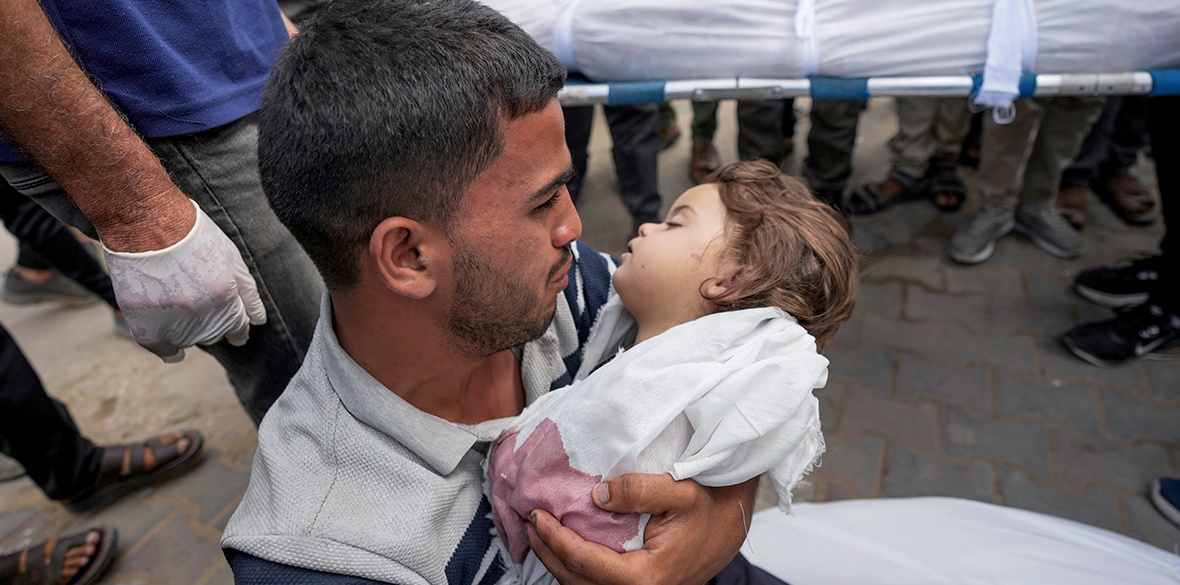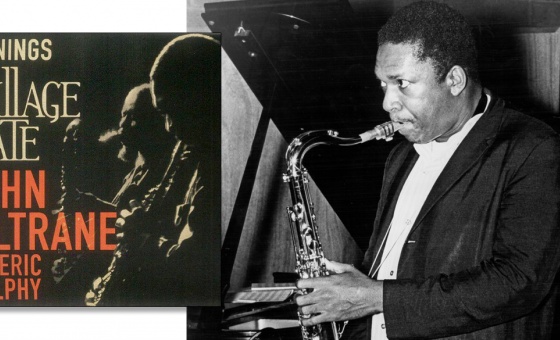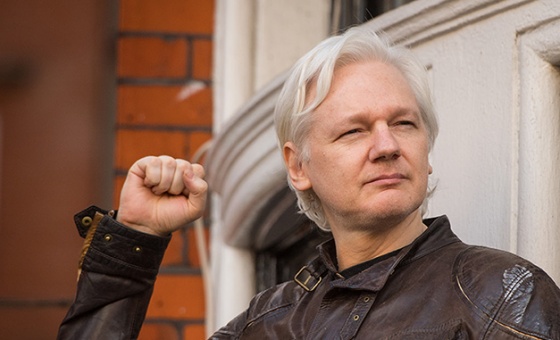This is the last article you can read this month
You can read more article this month
You can read more articles this month
Sorry your limit is up for this month
Reset on:
Please help support the Morning Star by subscribing here
AFTER seven months, the lead prosecutor at the International Criminal Court (ICC), Karim Khan KC, decided to announce that he would be looking into framing warrants regarding Israel’s genocidal war in Gaza.
With nearly 40,000 people dead and 10,000 missing, and with over 2 million people displaced and threatened with death from bombs or from disease, this war is one of the worst in recent years. Israel’s military has deliberately cut off Gaza from food and water, and has systematically bombed institutions of the state and civil society so that any return of the displaced will be more than difficult.
If the bombing ended today, it would take 14 years to clear out the unexploded ordinance. It would take an unimaginable amount of money and resources to rebuild Gaza so that it could return to some measure of normalcy. Khan is months too late with his statement, but never too late to charge high officials of the Israeli government with war crimes.
Rafah
The Israeli armed forces had told the Palestinians in Gaza that they should abandon their homes north of Wadi Gaza and head to the south. Then, when the Israelis felt that they had largely completed their mission in Gaza City, including destroying all the major cultural and humanitarian institutions there (universities and hospitals, for example), they informed the Palestinians to leave Khan Younis — the second largest city in Gaza — and head to Rafah, the Gaza Strip’s third largest city. This is precisely what over a million Palestinians did in the matter of a few days. They rushed south and then further south.
Now, the Israelis have told the Palestinians in Rafah to leave large parts of that city and head toward the coastline. There is simply no place for people to go, since the Israelis have seized the Rafah crossing into Egypt and they have blocked access to the borderlands near Israel (including the Kerem Shalom crossing). In a hurry, over 800,000 Palestinians have left Rafah and headed toward the Mediterranean Sea. They are living in makeshift shelters, unable to find decent food and water. Famine and disease are twins in this situation.
Northern Gaza
Between October 2023 and January 2024, the Israeli aircraft and tanks pummelled northern Gaza, particularly Gaza City. The level of bombardment was stark, with the Israelis — well-armed by the US and Britain — hitting any building that they felt should be a target. Entire neighbourhoods in Gaza City have been levelled, and entire families have been wiped out.
One of the areas particularly hard hit from the air was the Jabaliya refugee camp, set up in 1948 by those who had been forcibly displaced by the new Israeli states. Israel’s air force was unrelenting, hitting this entirely civilian area with maximum force. When the Israelis left the camp in early February 2024, al-Jazeera’s Anas al-Sharif went and spoke to residents who told him, “Nothing was spared. Land, houses, and trees were all destroyed. Nothing is habitable, but we will remain steadfast and unwavering with our strong determination.”
In May 2024, the Israelis returned to bomb the camp, once more killing civilians in this highly congested area. During the bombardment, Ibrahim Khaled who lives in the camp said on WhatsApp: “Today is the most difficult in terms of the occupation’s bombardment; air strikes, tank shelling have been going on non-stop.”
It is also clear that the resistance forces in the northern half of Gaza have not been totally defeated. They continue to harass any Israeli ground force, which is why in January 2024 the Israeli military withdrew five brigades out of Gaza and started a “third phase” in the war (which would mainly include aerial bombardment).
The “first phase” was the shelling and aerial bombardment of Gaza from October 7 to 27, and then the “second phase” was the ground invasion into Gaza. While Israel tried to suggest that this shift into the “third phase” was always part of their plan, it is clear that they had to reconsider sending troops into Gaza after they began to take casualties — 24 soldiers were killed on January 22, which is roughly when the Israelis moved to the “third phase.”
Israeli ruthlessness
Khan of the ICC might frame warrants for the arrest of high officials of the current Israeli government. However, the behaviour of Benjamin Netanyahu (who has been prime minister for over 16 years, between 1996 and 1999, then from 2009 to 2021, and finally from 2022) is not an individual act itself but rooted in the structure of Israel’s apartheid system and its ruthlessness toward Palestinians that is manifest in the plausible nature of the genocide (as noted by the International Court of Justice).
The genocidal intent goes back to the early days of Gun Zionism in Israel. It was an Israeli prime minister — Golda Meir — who denied the existence of the Palestinians in 1969 (“There was no such thing as Palestinians,”) and it was another Israeli prime minister — Yitzhak Rabin — who instructed his commanders to “break the bones” of young Palestinians who threw stones at the Israeli forces in the first intifada of 1989-91. This attitude structures the conduct of the Israeli army, not only in Gaza but equally in East Jerusalem and the West Bank. It is this attitude that has framed the annexationist policies in the entire Occupied Palestinian Territory.
During the official Israeli army’s war on the Palestinians in Gaza, the state-backed illegal settlers have been going on rampage upon rampage against the Palestinian villages and towns in the West Bank. Between April 12-16, for instance, illegal Israeli settlers attacked the villages of al-Mughayyir, Aqraba, Beitin, Deir Dibwan, and Duma. They killed Palestinian civilians, including medical workers, and destroyed olive groves and vegetable fields.
In mid-May, illegal Israeli settlers attacked the villages of Salfit and Yatma, burning parts of homes and seizing vehicles crucial to the agricultural life of the Palestinians. These vehicles — as in the case of Nablus and Wadi Qana — were carrying grain and fodder. Along the road between Jericho and Ramallah, illegal Israeli settlers stood and threw stones at passing cars driven by Palestinians.
Israeli soldiers stood by and did nothing to intervene. The general Israeli official attitude is that these settlers will raise the price of existence for the Palestinians, who then might decide to move across the border to Jordan. It is the utter ruthlessness of the violence that defines Israeli policy, both of the state institutions and of the illegal settlers.
There has been no attempt by the Israeli government to rein in the settlers, despite several UN resolutions about the illegality of the settlements. The situation has become so dire that even the New York Times had to report on its gravity (Ronen Bergman and Mark Mazzetti, The Unpunished: How Extremists Took Over Israel, May 16) and even Canadian and US lawmakers had to consider legal measures to prevent donations going from their countries to these settlements.
There have been several ceasefire proposals on the table, and despite the agreements from the Palestinian side, the Israelis have refused to enter a proper process. The Israelis are now convinced that they can continue this war until Hamas is destroyed, which is a ridiculous standard. Whether Hamas is able to recover from this barrage or not, the Palestinian resistance movement will remain, will regroup, and will continue to fight for the end to the occupation.
The only way for Israel to seek security is by acknowledging the demands of the Palestinians for their emancipation. Anything short of that — even the obliteration of Hamas (which was formed in 1987) — will be insufficient.
And therein lies the harsh truth for Israeli society: it is unwilling to accept the Palestinians as political subjects with their demands and their hopes, and in this unwillingness, the Israelis have put themselves into a genocidal logic which by itself cannot find the road to peace.
Vijay Prashad is an Indian historian, editor, and journalist. He is a writing fellow and chief correspondent at Globetrotter. He is an editor of LeftWord Books and the director of Tricontinental: Institute for Social Research. He has written more than 20 books, including The Darker Nations and The Poorer Nations. His latest books are Struggle Makes Us Human: Learning from Movements for Socialism and with Noam Chomsky The Withdrawal: Iraq, Libya, Afghanistan, and the Fragility of US Power.











